By The Final Call
- February 9, 2021
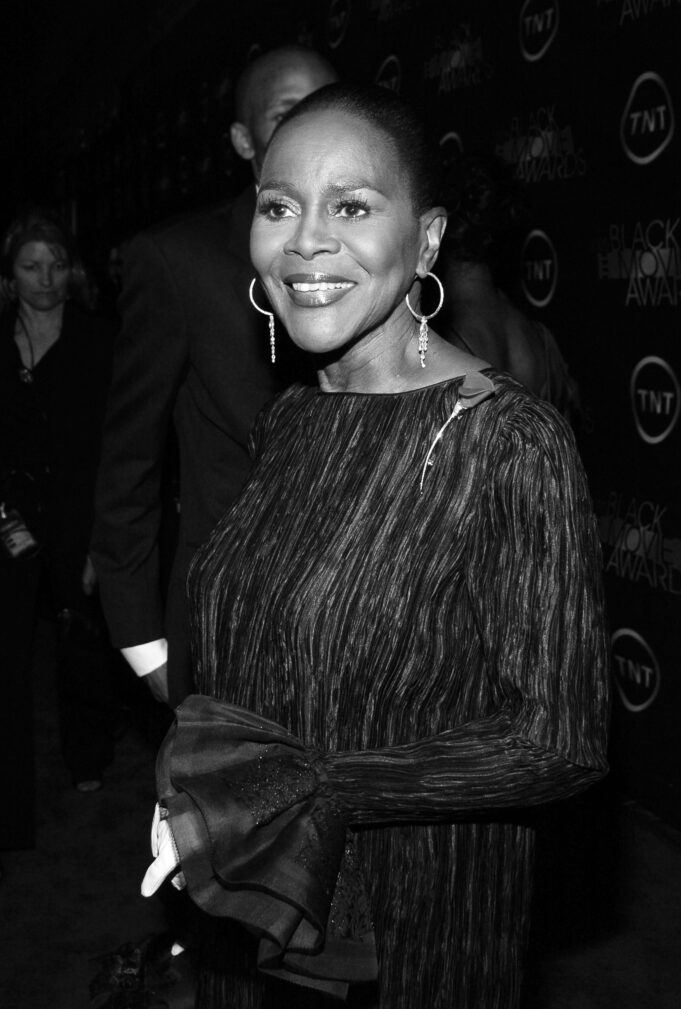
Cicely Tyson (Photo by John Sciulli/WireImage)
by Starla Muhammad, Anisah Muhammad, Nisa Islam Muhammad and Tariqah Shakir-Muhammad
Radiant, dignified, elegant, classy, refined, draped in beautiful, bold, and breathtaking Blackness. That was stage, TV and film legend Cicely Tyson, but she was so much more. The world will have the chance to pay their final respects to the iconic Ms. Tyson during her homegoing service at the historic Abyssinian Baptist Church in New York on Feb. 15. She will lie in repose from 10 a.m.– 6 p.m. and the service will observe Covid-19 protocols.
by Starla Muhammad, Anisah Muhammad, Nisa Islam Muhammad and Tariqah Shakir-Muhammad
Radiant, dignified, elegant, classy, refined, draped in beautiful, bold, and breathtaking Blackness. That was stage, TV and film legend Cicely Tyson, but she was so much more. The world will have the chance to pay their final respects to the iconic Ms. Tyson during her homegoing service at the historic Abyssinian Baptist Church in New York on Feb. 15. She will lie in repose from 10 a.m.– 6 p.m. and the service will observe Covid-19 protocols.
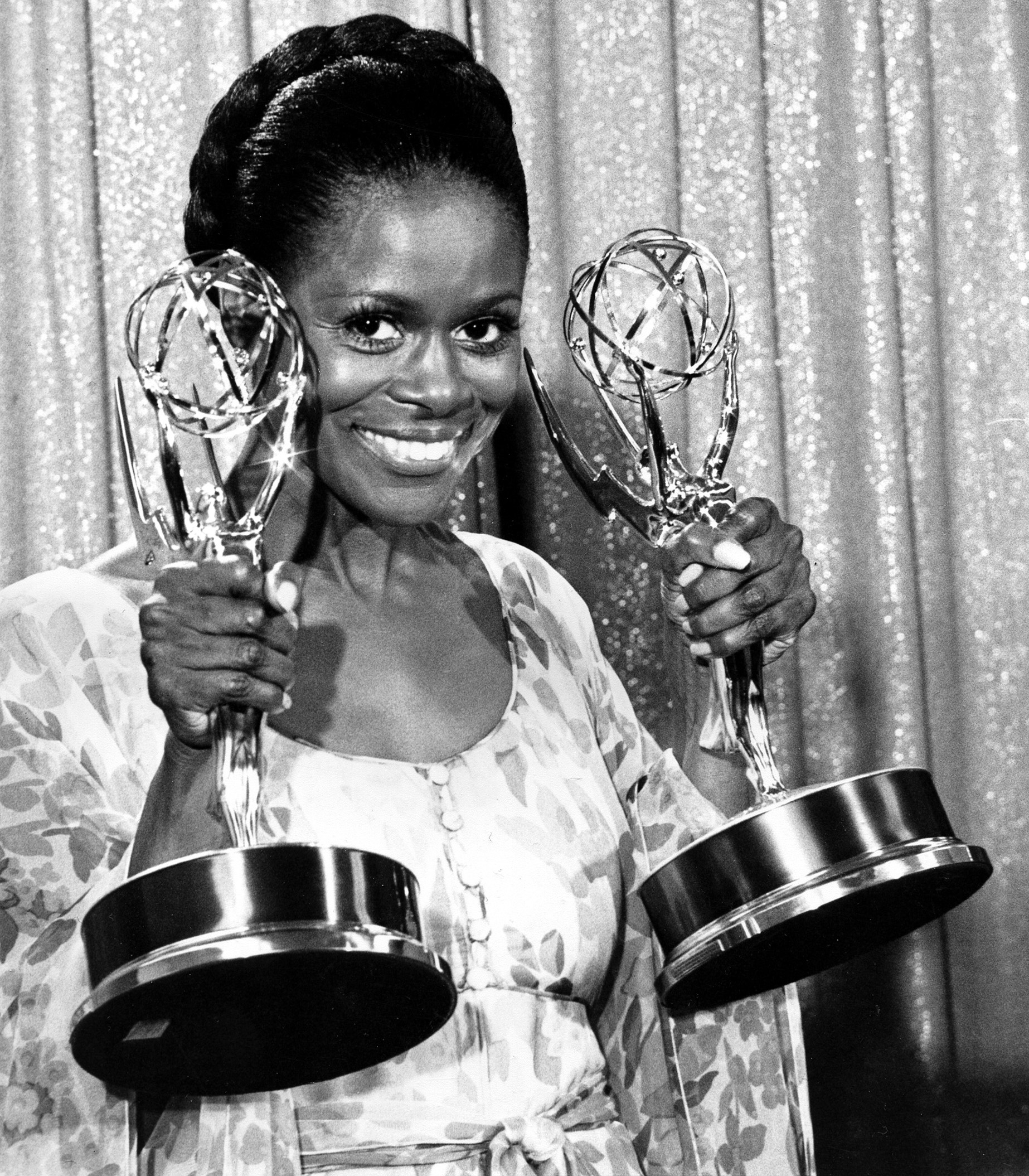
Cicely Tyson poses with her Emmy statuettes at the annual Emmy Awards presentation in Los Angeles, Ca., May 28, 1974. Tyson won for her role in “The Autobiography of Miss Jane Pittman” for actress of the year, special, and best lead actress in a television drama for a special program. (AP Photo)
The pioneering and legendary Ms. Tyson, whose career spanned seven decades was the recipient of multiple NAACP Image Awards, received an Oscar nomination for her role as the sharecropper’s wife in “Sounder,” won a Tony Award at age 88 and touched TV viewers’ hearts in “The Autobiography of Miss Jane Pittman,” passed away Jan. 28 at age 96.
Sentiments poured in from all over the world from those whose lives she impacted, inspired, and touched through her unapologetic portrayals of Black women. Her distinct voice, distinguishing presence and radiant smile endeared her to Black folks who yearned to see non-stereotypical portrayals of themselves on screen.
Marty Austin Lamar, coordinator for the BFA Musical Program at Howard University, was at a football game when he met Cicely Tyson for the first time.
“I went to Florida A&M University for undergrad, and this was the Florida Classic and she was one of the featured guests. And I just remember her kindness. I remember her … sense of style and her willingness to interact with the community,” he told The Final Call.
Mr. Lamar said he will always remember Ms. Tyson’s skills and her ability to transfer her skills from television to film to the stage and that it will be years from now when the world truly understands her impact.
“I think it’ll be years from now that the world really knows just how powerful her presence was and how even at the wise age of 96, that she was still blazing trails. That up until the day that she transitioned, she was basically on a media tour promoting her amazing book, ‘Just As I Am,’ ” he said. Ms. Tyson’s 400-page memoir was released Jan. 26, just two days before her passing. At Final Call presstime and according to several media reports, the book has already topped the bestsellers list and sold out on Amazon shortly after her death was announced.
Mr. Lamar described Ms. Tyson’s legacy as truth and perseverance. “Her legacy is truth through art and being true to who you are and who you say you will be on and more importantly off of the camera, off of the screen, outside of the light. She lived the life that she spoke about and the life that she portrayed, always playing strong women, always telling the truth and giving truth to the stories of women, particularly Black women in these United States,” he said. “And so her legacy will be one of, in my opinion, a gatekeeper, that she held our stories in her heart and that she was willing to ensure that they were told with grace and dignity and they were told in power.”
The pioneering and legendary Ms. Tyson, whose career spanned seven decades was the recipient of multiple NAACP Image Awards, received an Oscar nomination for her role as the sharecropper’s wife in “Sounder,” won a Tony Award at age 88 and touched TV viewers’ hearts in “The Autobiography of Miss Jane Pittman,” passed away Jan. 28 at age 96.
Sentiments poured in from all over the world from those whose lives she impacted, inspired, and touched through her unapologetic portrayals of Black women. Her distinct voice, distinguishing presence and radiant smile endeared her to Black folks who yearned to see non-stereotypical portrayals of themselves on screen.
Marty Austin Lamar, coordinator for the BFA Musical Program at Howard University, was at a football game when he met Cicely Tyson for the first time.
“I went to Florida A&M University for undergrad, and this was the Florida Classic and she was one of the featured guests. And I just remember her kindness. I remember her … sense of style and her willingness to interact with the community,” he told The Final Call.
Mr. Lamar said he will always remember Ms. Tyson’s skills and her ability to transfer her skills from television to film to the stage and that it will be years from now when the world truly understands her impact.
“I think it’ll be years from now that the world really knows just how powerful her presence was and how even at the wise age of 96, that she was still blazing trails. That up until the day that she transitioned, she was basically on a media tour promoting her amazing book, ‘Just As I Am,’ ” he said. Ms. Tyson’s 400-page memoir was released Jan. 26, just two days before her passing. At Final Call presstime and according to several media reports, the book has already topped the bestsellers list and sold out on Amazon shortly after her death was announced.
Mr. Lamar described Ms. Tyson’s legacy as truth and perseverance. “Her legacy is truth through art and being true to who you are and who you say you will be on and more importantly off of the camera, off of the screen, outside of the light. She lived the life that she spoke about and the life that she portrayed, always playing strong women, always telling the truth and giving truth to the stories of women, particularly Black women in these United States,” he said. “And so her legacy will be one of, in my opinion, a gatekeeper, that she held our stories in her heart and that she was willing to ensure that they were told with grace and dignity and they were told in power.”
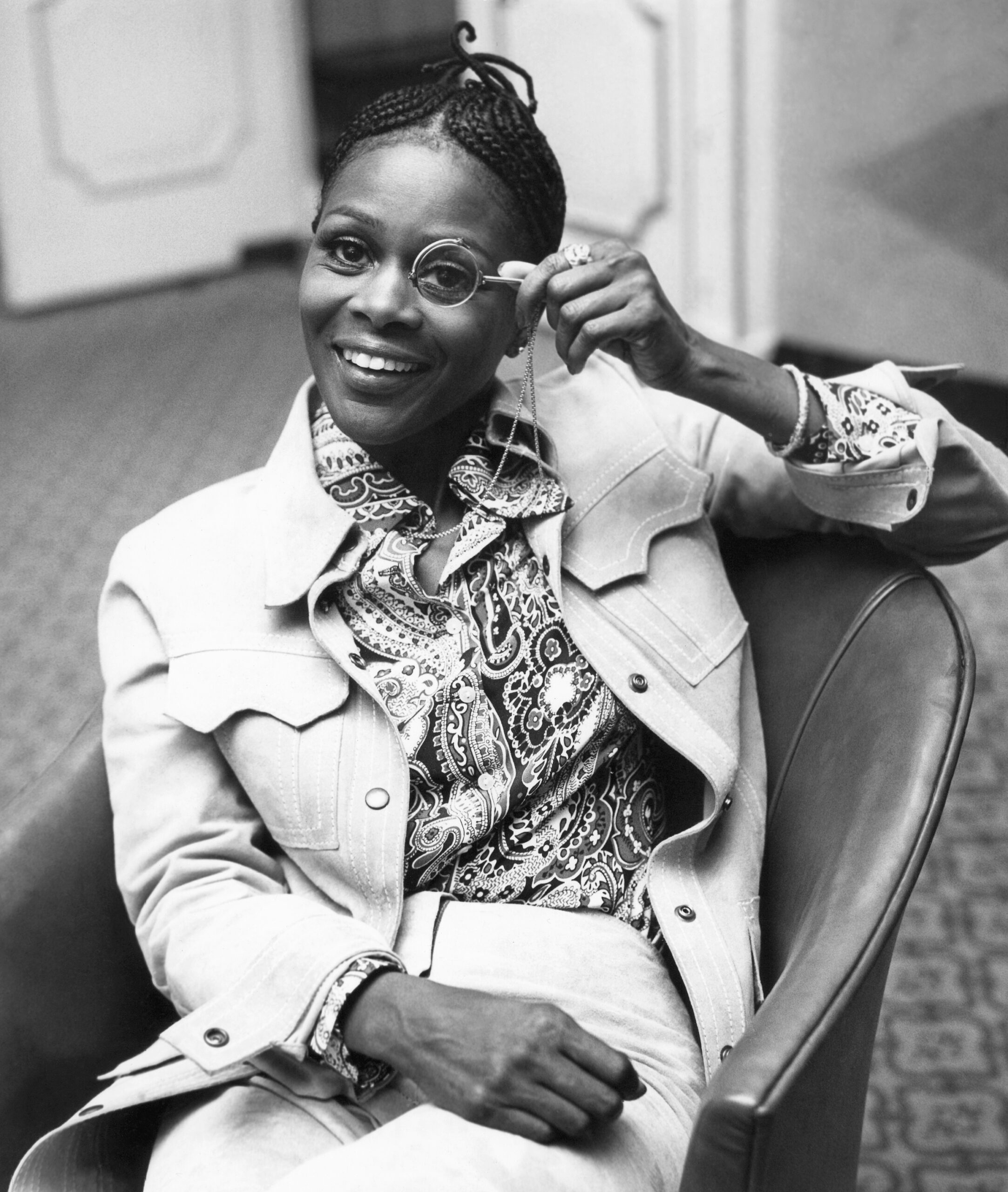
Cicely Tyson peers through a monocle at the Dorchester
Hotel in London, Feb. 19, 1973. Photo: AP Photo, File
He urged the world to take a moment to recognize that Cicely Tyson reached heights unheard of, past the acclaim Hollywood gave her.
“She will always be remembered not only as an artist but as an advocate for truth and a standard bearer, which is just a blessing,” he said.
A groundbreaking presence and trendsetter
A onetime model, Ms. Tyson began her screen career with small parts but gained fame in the early 1970s when Black women were finally starting to get a few starring roles. Ms. Tyson refused to take parts simply for the paycheck, remaining selective in the roles she played.
“I’m very selective as I’ve been my whole career about what I do. Unfortunately, I’m not the kind of person who works only for money. It has to have some real substance for me to do it,” she told The Associated Press in 2013.
“She took pride in knowing that whenever her face was on camera, she would be playing a character who was a human being—flawed but resilient; perfect not despite but because of their imperfections,” wrote former President Barack Obama, who awarded Ms. Tyson the Medal of Freedom in 2016.
She is widely known for “Roots,” “The Autobiography of Miss Jane Pittman,” “Fried Green Tomatoes” and “Sounder.” She won three Emmys, and many awards from civil rights and women’s groups. When she was 88, she became the oldest person to win a Tony, for her 2013 Broadway role in a revival of Horton Foote’s “The Trip to Bountiful.”
Her acclaim didn’t end there, at 93, she won an honorary Oscar, and was inducted into the American Theater Hall of Fame in 2018 and into the Television Hall of Fame in 2020. She also won a career achievement Peabody Award in 2020.
Hotel in London, Feb. 19, 1973. Photo: AP Photo, File
He urged the world to take a moment to recognize that Cicely Tyson reached heights unheard of, past the acclaim Hollywood gave her.
“She will always be remembered not only as an artist but as an advocate for truth and a standard bearer, which is just a blessing,” he said.
A groundbreaking presence and trendsetter
A onetime model, Ms. Tyson began her screen career with small parts but gained fame in the early 1970s when Black women were finally starting to get a few starring roles. Ms. Tyson refused to take parts simply for the paycheck, remaining selective in the roles she played.
“I’m very selective as I’ve been my whole career about what I do. Unfortunately, I’m not the kind of person who works only for money. It has to have some real substance for me to do it,” she told The Associated Press in 2013.
“She took pride in knowing that whenever her face was on camera, she would be playing a character who was a human being—flawed but resilient; perfect not despite but because of their imperfections,” wrote former President Barack Obama, who awarded Ms. Tyson the Medal of Freedom in 2016.
She is widely known for “Roots,” “The Autobiography of Miss Jane Pittman,” “Fried Green Tomatoes” and “Sounder.” She won three Emmys, and many awards from civil rights and women’s groups. When she was 88, she became the oldest person to win a Tony, for her 2013 Broadway role in a revival of Horton Foote’s “The Trip to Bountiful.”
Her acclaim didn’t end there, at 93, she won an honorary Oscar, and was inducted into the American Theater Hall of Fame in 2018 and into the Television Hall of Fame in 2020. She also won a career achievement Peabody Award in 2020.
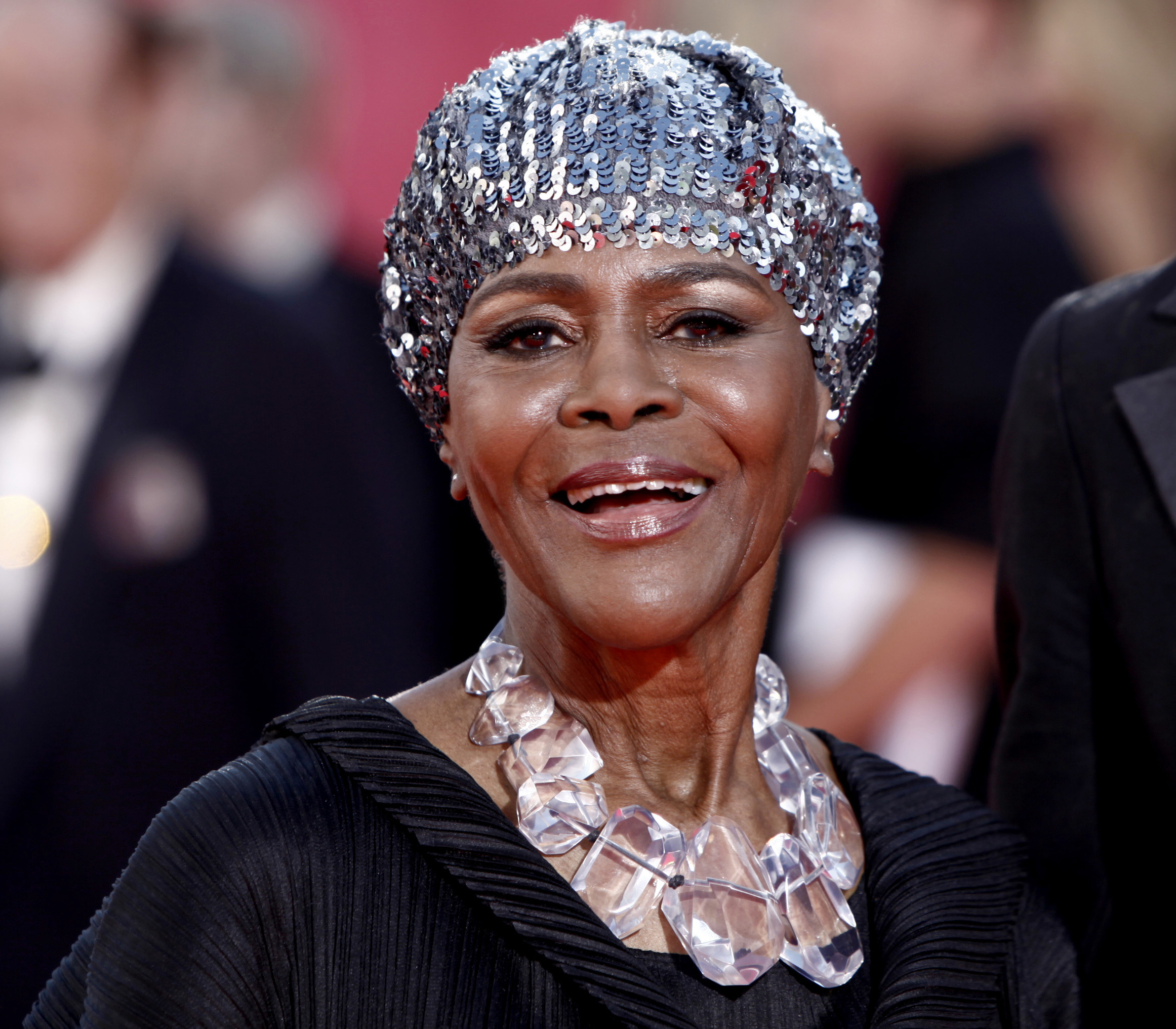
Cicely Tyson arrives at the 61st Primetime Emmy Awards on Sept. 20, 2009, in Los Angeles. (AP Photo/Matt Sayles, File)
“More than anything, she wasn’t just a talented actress, she was a trendsetter,” film and TV producer Aaron Williams of Digital Media House told The Final Call. “She opened up a lot of doors for the African American community as far as the arts. She’s one of the few women that’s lived almost a hundred years. She’s lived through a lot of different decades of life. There’s very few Black women that were considered real celebrities or stars in the industry that have broken the ceiling like she did,” he added.
“She was one of the first, like Sidney Poitier, that opened up doors that were unseen around Hollywood at the time to showcase Blacks in a different light. She showed how women of color could be in power when that was unheard of.”
This brilliant Black woman, so confident and assured of who she was, took center stage only in parts that humanized her characters. While she was offered many roles as the stereotypical Black maid, prostitute, or drug addict, she rejected them all. She also encouraged other Black actors to do the same even if it meant going without work.
That meant White Hollywood had few roles for this Black beauty. She landed major roles in movies with the 1959 Harry Belafonte film “Odds Against Tomorrow,” followed by “The Comedians,” “The Last Angry Man,” “A Man Called Adam” and “The Heart Is a Lonely Hunter.”
Her early career began as a model and at her apex she was seen in Essence, Ebony, Vogue, and Harper’s Bazaar. Born of parents from the Caribbean Island of Nevis in East Harlem, Ms. Tyson studied at the Actors Studio and began to take small TV roles. Those small roles led to bigger and better roles.
Her next big break came in 1972 with “Sounder”. That movie received several Oscar nominations including one for Ms. Tyson as best actress.
“More than anything, she wasn’t just a talented actress, she was a trendsetter,” film and TV producer Aaron Williams of Digital Media House told The Final Call. “She opened up a lot of doors for the African American community as far as the arts. She’s one of the few women that’s lived almost a hundred years. She’s lived through a lot of different decades of life. There’s very few Black women that were considered real celebrities or stars in the industry that have broken the ceiling like she did,” he added.
“She was one of the first, like Sidney Poitier, that opened up doors that were unseen around Hollywood at the time to showcase Blacks in a different light. She showed how women of color could be in power when that was unheard of.”
This brilliant Black woman, so confident and assured of who she was, took center stage only in parts that humanized her characters. While she was offered many roles as the stereotypical Black maid, prostitute, or drug addict, she rejected them all. She also encouraged other Black actors to do the same even if it meant going without work.
That meant White Hollywood had few roles for this Black beauty. She landed major roles in movies with the 1959 Harry Belafonte film “Odds Against Tomorrow,” followed by “The Comedians,” “The Last Angry Man,” “A Man Called Adam” and “The Heart Is a Lonely Hunter.”
Her early career began as a model and at her apex she was seen in Essence, Ebony, Vogue, and Harper’s Bazaar. Born of parents from the Caribbean Island of Nevis in East Harlem, Ms. Tyson studied at the Actors Studio and began to take small TV roles. Those small roles led to bigger and better roles.
Her next big break came in 1972 with “Sounder”. That movie received several Oscar nominations including one for Ms. Tyson as best actress.
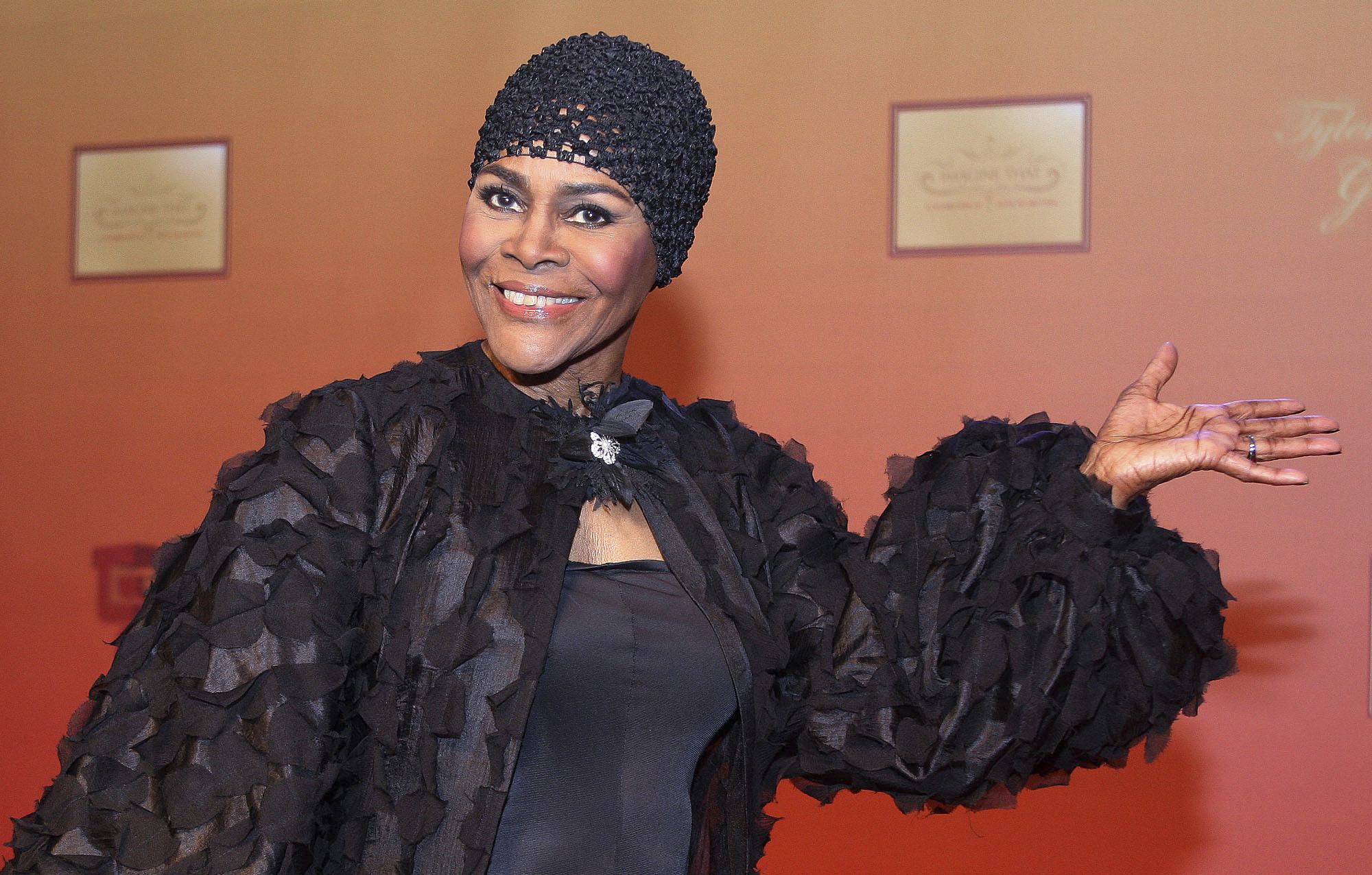
Actress Cicely Tyson arrives at the unveiling of director and producer Tyler Perry’s new motion picture and television studio in Atlanta on Oct. 4, 2008. Tyson, the pioneering Black actress who gained an Oscar nomination for her role as the sharecropper’s wife in “Sounder,” a Tony Award in 2013 at age 88 and touched TV viewers’ hearts in “The Autobiography of Miss Jane Pittman,” has died. She was 96. Tyson’s death was announced by her family, via her manager Larry Thompson, who did not immediately provide additional details. (AP Photo/W.A.Harewood, File)
She won a supporting actress Emmy in 1994 for “Oldest Living Confederate Widow Tells All.” She was nominated for Emmys several other times, including for “Roots,” “King,” “The Marva Collins Story” “Sweet Justice” and “A Lesson Before Dying.”
In recent years, she was part of a panel discussion for “Cherish the Day,” an eight-episode OWN anthology series created and produced by Ava DuVernay. She played the mother of Viola Davis’ character on “How to Get Away with Murder.”
Ms. Tyson’s parents moved from the island of Nevis in the Caribbean to New York, where Cicely (her name was spelled early on as Cecily and Sicely) was born in 1924, the youngest of three children. She is also a cousin of the Honorable Minister Louis Farrakhan of the Nation of Islam. She was previously married to the jazz legend Miles Davis from 1981 to 1989 and had a daughter from a previous marriage.
“Her acting abilities were superb. She was more than phenomenal. She was my phenomenal woman,” Monica R. Butler, television and film producer of the Butler Group told The Final Call. She’s worked with producer/director Tyler Perry and entertainer Je’Caryous Johnson.
“She impacted my career just by being who she was. She always set the standard, she set the bar high with class and grace in everything that she did. She was an excellent role model,” said Ms. Butler.
Ms. Tyson’s role and impact continues to be felt in the industry today when filmmakers are looking for new talent.
“She definitely opened up a lot of doors. When you look at Netflix now you look at a brand new category, strong Black female leads. Now, they want to know are there any female writers on your team, are there any female producers? The industry is actually looking for Black women in the arts,” said Mr. Williams. “She was a trendsetter in her career with her elegance and her poise. Just look at the type of roles she took. On top of that she was humble, and it went a long way to serve the Black community,” he added.
Margaret Mahdi, a playwriter, director, producer and founder of Mahdi Productions based in Chicago told The Final Call that Ms. Tyson was the epitome of grace and dignity.
“Our beloved Ms. Cicely Tyson epitomizes grace, dignity, integrity, civility, and refinement. She has set a standard of respect for not only Black women actresses but all women. Now, we can work in the industry knowing and accepting our worth and not having to settle to the world’s standard of what an actress should be,” said Ms. Mahdi.
She won a supporting actress Emmy in 1994 for “Oldest Living Confederate Widow Tells All.” She was nominated for Emmys several other times, including for “Roots,” “King,” “The Marva Collins Story” “Sweet Justice” and “A Lesson Before Dying.”
In recent years, she was part of a panel discussion for “Cherish the Day,” an eight-episode OWN anthology series created and produced by Ava DuVernay. She played the mother of Viola Davis’ character on “How to Get Away with Murder.”
Ms. Tyson’s parents moved from the island of Nevis in the Caribbean to New York, where Cicely (her name was spelled early on as Cecily and Sicely) was born in 1924, the youngest of three children. She is also a cousin of the Honorable Minister Louis Farrakhan of the Nation of Islam. She was previously married to the jazz legend Miles Davis from 1981 to 1989 and had a daughter from a previous marriage.
“Her acting abilities were superb. She was more than phenomenal. She was my phenomenal woman,” Monica R. Butler, television and film producer of the Butler Group told The Final Call. She’s worked with producer/director Tyler Perry and entertainer Je’Caryous Johnson.
“She impacted my career just by being who she was. She always set the standard, she set the bar high with class and grace in everything that she did. She was an excellent role model,” said Ms. Butler.
Ms. Tyson’s role and impact continues to be felt in the industry today when filmmakers are looking for new talent.
“She definitely opened up a lot of doors. When you look at Netflix now you look at a brand new category, strong Black female leads. Now, they want to know are there any female writers on your team, are there any female producers? The industry is actually looking for Black women in the arts,” said Mr. Williams. “She was a trendsetter in her career with her elegance and her poise. Just look at the type of roles she took. On top of that she was humble, and it went a long way to serve the Black community,” he added.
Margaret Mahdi, a playwriter, director, producer and founder of Mahdi Productions based in Chicago told The Final Call that Ms. Tyson was the epitome of grace and dignity.
“Our beloved Ms. Cicely Tyson epitomizes grace, dignity, integrity, civility, and refinement. She has set a standard of respect for not only Black women actresses but all women. Now, we can work in the industry knowing and accepting our worth and not having to settle to the world’s standard of what an actress should be,” said Ms. Mahdi.

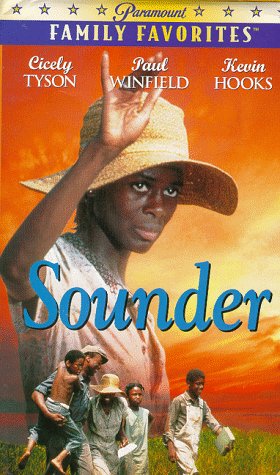
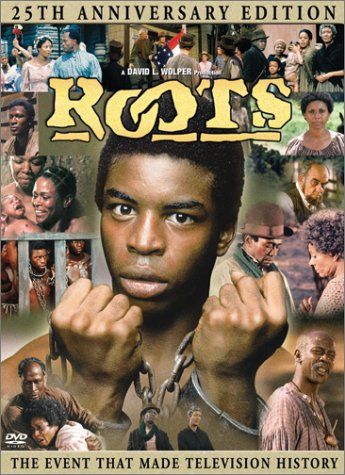
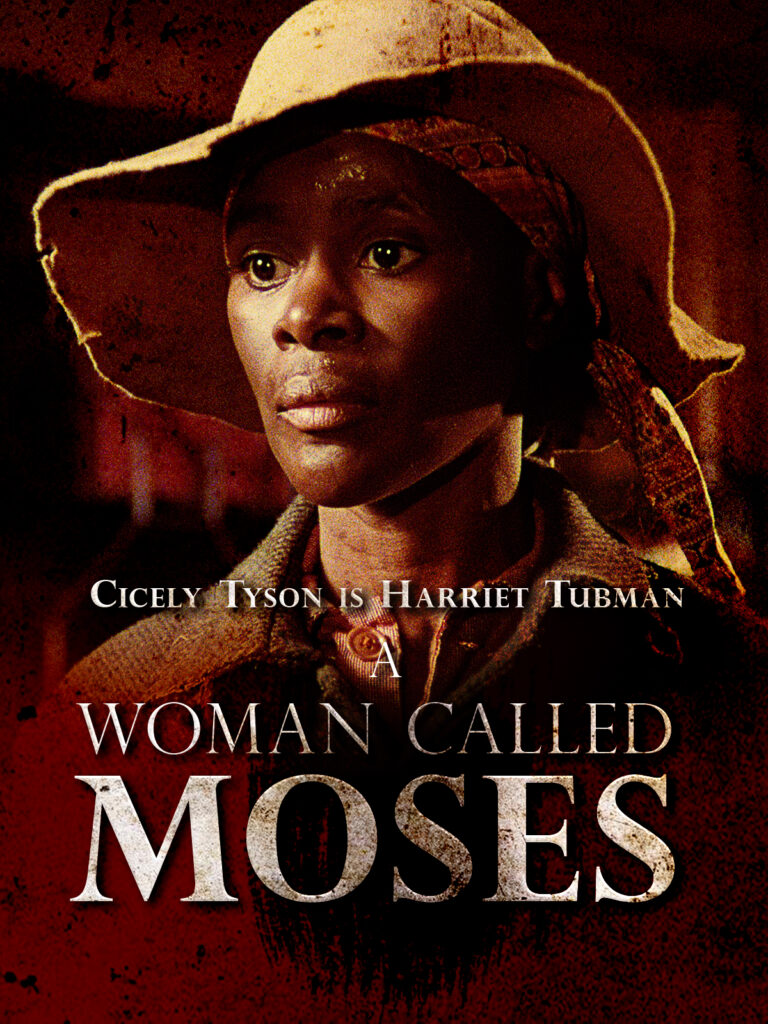
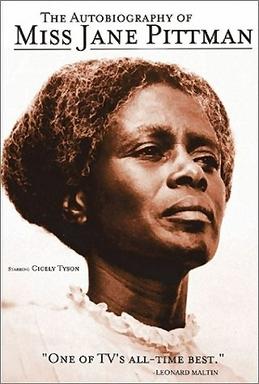
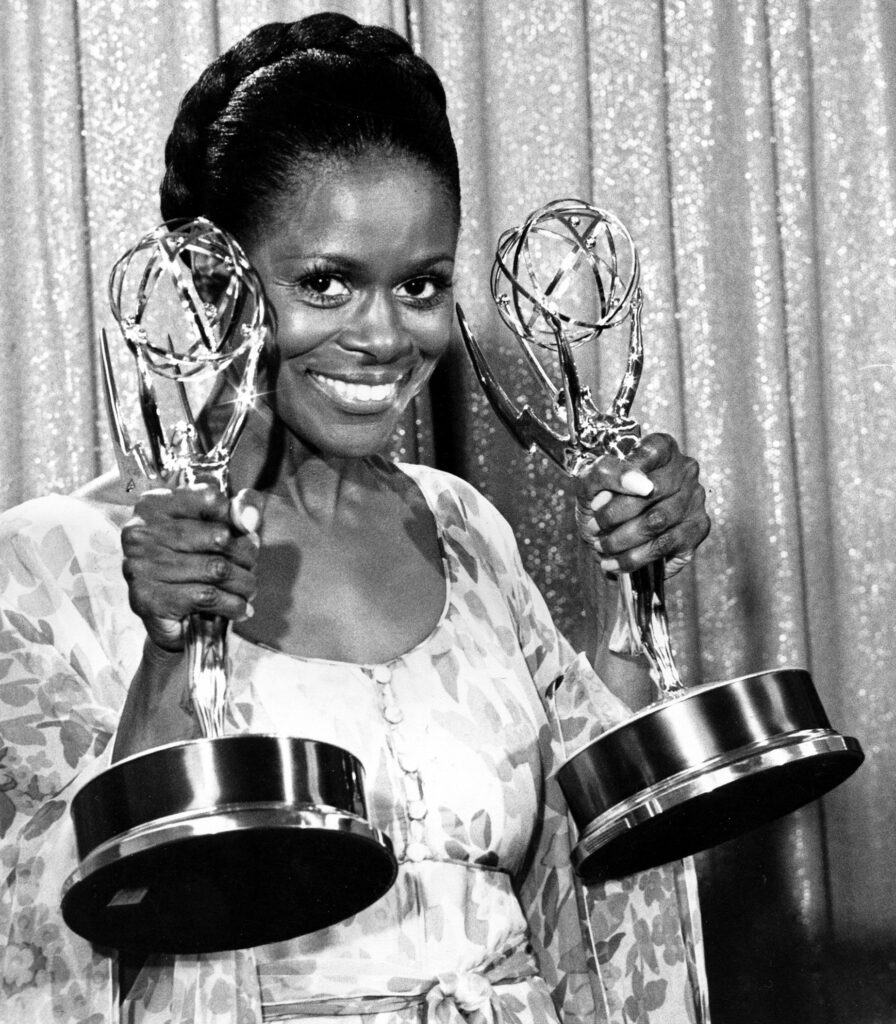
Cicely Tyson poses with her Emmy statuettes at the annual Emmy Awards presentation in Los Angeles, Ca., May 28, 1974. Tyson won for her role in “The Autobiography of Miss Jane Pittman” for actress of the year, special, and best lead actress in a television drama for a special program. (AP Photo)
“She raised the bar and opened the doors for all to be proud and confident in the talent that God has gifted us with. She was/is a woman of great substance and this is what she portrayed in her characters on and off the world stages and screens,” she added.
“I want to be recalled as one who squared my shoulders in the service of Black women, as one who made us walk taller and envision greater for ourselves,” Ms. Tyson once shared.
An image to behold
Ms. Tyson was heavily involved in the Black is Beautiful movement, gracing the covers of Ebony, Essence and Jet magazines and encouraging Black women to embrace their own standard of beauty.
It was beholding Ms. Tyson’s strikingly image on Essence magazine that captivated Carla Morrison as a young dark-skinned Black girl. “Essence magazine came out the same year that I was born and I don’t know how many times Cicely Tyson was on the cover but I saw that woman many of times before I understood what she was for us,” said the Atlanta-based founder of Sisters of Today and Tomorrow, a mentoring organization for young, Black girls, teens and young women.
“Seeing a lady that looks just like me, not just because she was a woman of color, but she’s a dark-skinned sister and understanding how we as Africans and African Americans do each other, in terms of colorism, meant the world,” Ms. Morrison told The Final Call.
“She was playing these roles, and it was like OK! And they (roles) were so believable. And then you see her playing these roles and it may not have been the most glamorous role but she played that role, and then you got to see her on the red carpet someplace, looking just as elegant and beautiful. And the fact that this lady has been doing this work for 70-something years and she still was slaying on the red carpet at 96 is so amazing!”
When Makeen Zachery first heard about Cicely Tyson’s passing, her heart sank. “It was a day that I prayed would never come, despite of course knowing that isn’t possible. In many ways I and so many other Black folks, specifically Black women, felt an almost familial connection to her spirit, it was displayed that clearly through her roles and professional endeavors that we all trusted her to reflect us in our absolute best light. This loss hurt in a way that felt personal,” she told The Final Call via email.
Ms. Zachery, the founder and editor of www.blkgirlculture.com, said the actress had a way of modeling freedom through the way she spoke and moved.
“She did so in a way that made such freedom contagious. She validated for so many Black women, spanning nearly five generations since the beginning of her acting career, that you can find joy and success without losing control over your own image— for Black women that is the most liberating thing we can do: to choose how we are represented and how we represent ourselves in this world,” she said.
Melanie Campbell of the Black Women’s Roundtable didn’t have many one-on-one conversations with the incomparable Ms. Tyson, but she had been in the room with her on several occasions. “Cicely Tyson was one of those people that you were just blessed to be in the room, because you knew you would learn something whenever she got up to speak. You learned something from her, especially as a Black woman in this world,” she said.
“She raised the bar and opened the doors for all to be proud and confident in the talent that God has gifted us with. She was/is a woman of great substance and this is what she portrayed in her characters on and off the world stages and screens,” she added.
“I want to be recalled as one who squared my shoulders in the service of Black women, as one who made us walk taller and envision greater for ourselves,” Ms. Tyson once shared.
An image to behold
Ms. Tyson was heavily involved in the Black is Beautiful movement, gracing the covers of Ebony, Essence and Jet magazines and encouraging Black women to embrace their own standard of beauty.
It was beholding Ms. Tyson’s strikingly image on Essence magazine that captivated Carla Morrison as a young dark-skinned Black girl. “Essence magazine came out the same year that I was born and I don’t know how many times Cicely Tyson was on the cover but I saw that woman many of times before I understood what she was for us,” said the Atlanta-based founder of Sisters of Today and Tomorrow, a mentoring organization for young, Black girls, teens and young women.
“Seeing a lady that looks just like me, not just because she was a woman of color, but she’s a dark-skinned sister and understanding how we as Africans and African Americans do each other, in terms of colorism, meant the world,” Ms. Morrison told The Final Call.
“She was playing these roles, and it was like OK! And they (roles) were so believable. And then you see her playing these roles and it may not have been the most glamorous role but she played that role, and then you got to see her on the red carpet someplace, looking just as elegant and beautiful. And the fact that this lady has been doing this work for 70-something years and she still was slaying on the red carpet at 96 is so amazing!”
When Makeen Zachery first heard about Cicely Tyson’s passing, her heart sank. “It was a day that I prayed would never come, despite of course knowing that isn’t possible. In many ways I and so many other Black folks, specifically Black women, felt an almost familial connection to her spirit, it was displayed that clearly through her roles and professional endeavors that we all trusted her to reflect us in our absolute best light. This loss hurt in a way that felt personal,” she told The Final Call via email.
Ms. Zachery, the founder and editor of www.blkgirlculture.com, said the actress had a way of modeling freedom through the way she spoke and moved.
“She did so in a way that made such freedom contagious. She validated for so many Black women, spanning nearly five generations since the beginning of her acting career, that you can find joy and success without losing control over your own image— for Black women that is the most liberating thing we can do: to choose how we are represented and how we represent ourselves in this world,” she said.
Melanie Campbell of the Black Women’s Roundtable didn’t have many one-on-one conversations with the incomparable Ms. Tyson, but she had been in the room with her on several occasions. “Cicely Tyson was one of those people that you were just blessed to be in the room, because you knew you would learn something whenever she got up to speak. You learned something from her, especially as a Black woman in this world,” she said.

This May 1993 photo was from the second African African-American Summit in Gabon, Africa which was attended by a delegation from the Nation of Islam as well as other distinguished participants. The summit was organized by Rev. Leon Sullivan. In the front row from the left: Actress Cecily Tyson, actor Ossie Davis and his wife, actress Ruby Dee. Photo: A. Akbar Muhammad
Ms. Tyson used her platform for good and never stopped sharing, explained Ms. Campbell. She recalled learning about a school in New Jersey that was named after the actress. “You really didn’t hear a lot about that. But she actually had been really involved in supporting young people for years, that she didn’t want a school just named after her. She wanted to pour in. So, she paid it forward, backwards, everything in between, when it came to giving. So that’s what I remember about her most,” said Ms. Campbell.
When she reflects on Cicely Tyson, she sees a person who lived a purposeful life. “I think for young people it’s like, to be able to see that and say, I could be Cicely Tyson. And what’s that? That’s a person with a purpose-driven life. So it’s not to say I’m gonna be an artist or actor, but whatever you’re doing, you can give to your community,” she said.
“She was also very active in social justice and civil rights. She used that platform in the movement for rights and women’s rights, social justice. She spoke up, even during these times that we’re in,” continued Ms. Campbell.
Ms. Tyson’s life included decades of civil rights work and activism. At the height of the Civil Rights movement, Ms. Tyson became a founding board member of the Dance Theater of Harlem, reported Gothamist, a website about New York City news, arts and events. “In 1994, an East Harlem building where she lived as a child was named for her; it and three others were rehabilitated for 58 poor families. In 1995, a magnet school she supported in East Orange, N.J., was renamed the Cicely Tyson School of Performing and Fine Arts,” the Times said, reported Gothamist. She was honored by the Congress of Racial Equality, the NAACP, and the National Council of Negro Women.
“Not only was she an actress, but a leader,” said Chicago-based community activist Carolyn Ruff. “Me fighting for justice, equality for our young people, fairness for our young people—by her fighting for me, for me to go through school, for me to have hope that things are going to get better I truly believe this is our time. I’m talking about the women, this is our time,” she said.
“She really inspired me to keep fighting for what we’re fighting for, and to continue to be a strong, Black woman,” continued Ms. Ruff.
Longtime media personality Bev Smith was blessed to know Ms. Tyson personally. They first met one another in the early 1980s on the set of Ms. Smith’s groundbreaking BET show, “Our Voices.” Ms. Smith said she used to affectionately call the iconic actress, “Miss Cecily.”
Ms. Tyson used her platform for good and never stopped sharing, explained Ms. Campbell. She recalled learning about a school in New Jersey that was named after the actress. “You really didn’t hear a lot about that. But she actually had been really involved in supporting young people for years, that she didn’t want a school just named after her. She wanted to pour in. So, she paid it forward, backwards, everything in between, when it came to giving. So that’s what I remember about her most,” said Ms. Campbell.
When she reflects on Cicely Tyson, she sees a person who lived a purposeful life. “I think for young people it’s like, to be able to see that and say, I could be Cicely Tyson. And what’s that? That’s a person with a purpose-driven life. So it’s not to say I’m gonna be an artist or actor, but whatever you’re doing, you can give to your community,” she said.
“She was also very active in social justice and civil rights. She used that platform in the movement for rights and women’s rights, social justice. She spoke up, even during these times that we’re in,” continued Ms. Campbell.
Ms. Tyson’s life included decades of civil rights work and activism. At the height of the Civil Rights movement, Ms. Tyson became a founding board member of the Dance Theater of Harlem, reported Gothamist, a website about New York City news, arts and events. “In 1994, an East Harlem building where she lived as a child was named for her; it and three others were rehabilitated for 58 poor families. In 1995, a magnet school she supported in East Orange, N.J., was renamed the Cicely Tyson School of Performing and Fine Arts,” the Times said, reported Gothamist. She was honored by the Congress of Racial Equality, the NAACP, and the National Council of Negro Women.
“Not only was she an actress, but a leader,” said Chicago-based community activist Carolyn Ruff. “Me fighting for justice, equality for our young people, fairness for our young people—by her fighting for me, for me to go through school, for me to have hope that things are going to get better I truly believe this is our time. I’m talking about the women, this is our time,” she said.
“She really inspired me to keep fighting for what we’re fighting for, and to continue to be a strong, Black woman,” continued Ms. Ruff.
Longtime media personality Bev Smith was blessed to know Ms. Tyson personally. They first met one another in the early 1980s on the set of Ms. Smith’s groundbreaking BET show, “Our Voices.” Ms. Smith said she used to affectionately call the iconic actress, “Miss Cecily.”
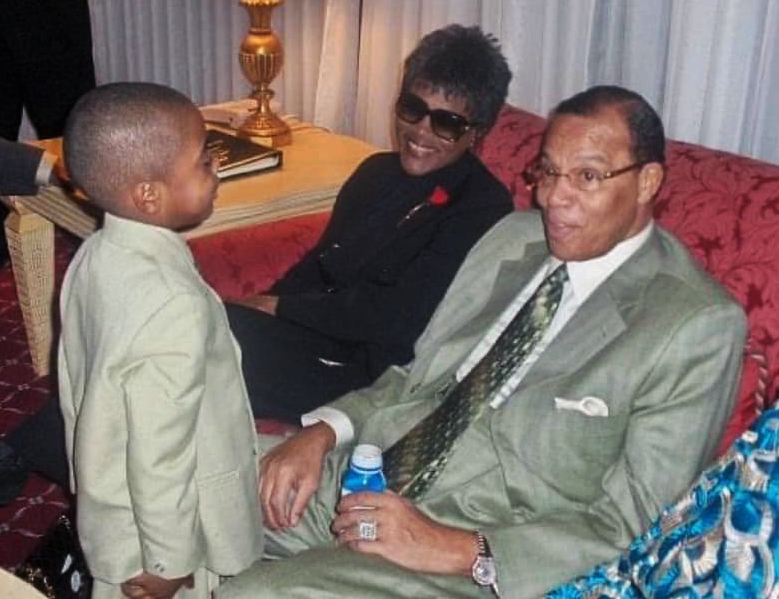
Cicely Tyson and the Honorable Minister Louis Farrakhan, who are first cousins, together at Saviours’ Day 2007 in Detroit with Chyron Muhammad. Photo: Yonasda Lonewolf
“I had seen her as most people had in television shows and followed her as the first Black woman to have a show and be a part of a national show on TV. I was so impressed with the way she carried herself. But what impressed me most about her is she did not deny who she was in the color of her skin, in the texture of her hair and in her dedication to making sure that the images of African American women were always positive,” Ms. Smith told The Final Call.
“For me when I met her all I could think of is how strong she was because we have … a lot of sisters who have opportunities and they’ve become very wealthy with those opportunities but sell out. By that I mean they do not remember who they are and it seems to me that as I get thoroughly entrenched in the Bible that I realize that I’m a living witness of God. She knew that. She knew who she was and she was strong. She did not sell out!”
Cecily Tyson was an African woman in America and she was going to represent African women in America, noted Ms. Smith.
“As a darker sister there were not that many examples so when I met her, I don’t get awestruck at a lot of people, but I was a little tongue-tied and she said, ‘Oh please, please, please don’t do that. Please just treat me like the folks that come on the show.’ That was the beginning of a relationship because she would many, many times call and leave a message at BET for ‘Our Voices’ for me,” reflected Ms. Smith.
On those messages Ms. Tyson would say, “Ms. Bev, the show was excellent,” “Ms. Bev don’t do that anymore,” shared Ms. Smith. “So, she was more than just a person on television and the movies. She was an example,” added Ms. Smith.
“Without Ms. Tyson, a legacy of conscious and deliberate representation of Black people would not exist in the way that we know it, we wouldn’t find ourselves as far along in this ongoing quest for representation that we are now,” noted Ms. Zachery. “Cicely was prophetic, she saw a future of freedom for Black people and made sure that her representations of us, whether on screens or on stages, pushed the ball further and further towards that glorious future that she and the revolutionaries before her imagined.” (Associated Press contributed to this report.)
No comments:
Post a Comment